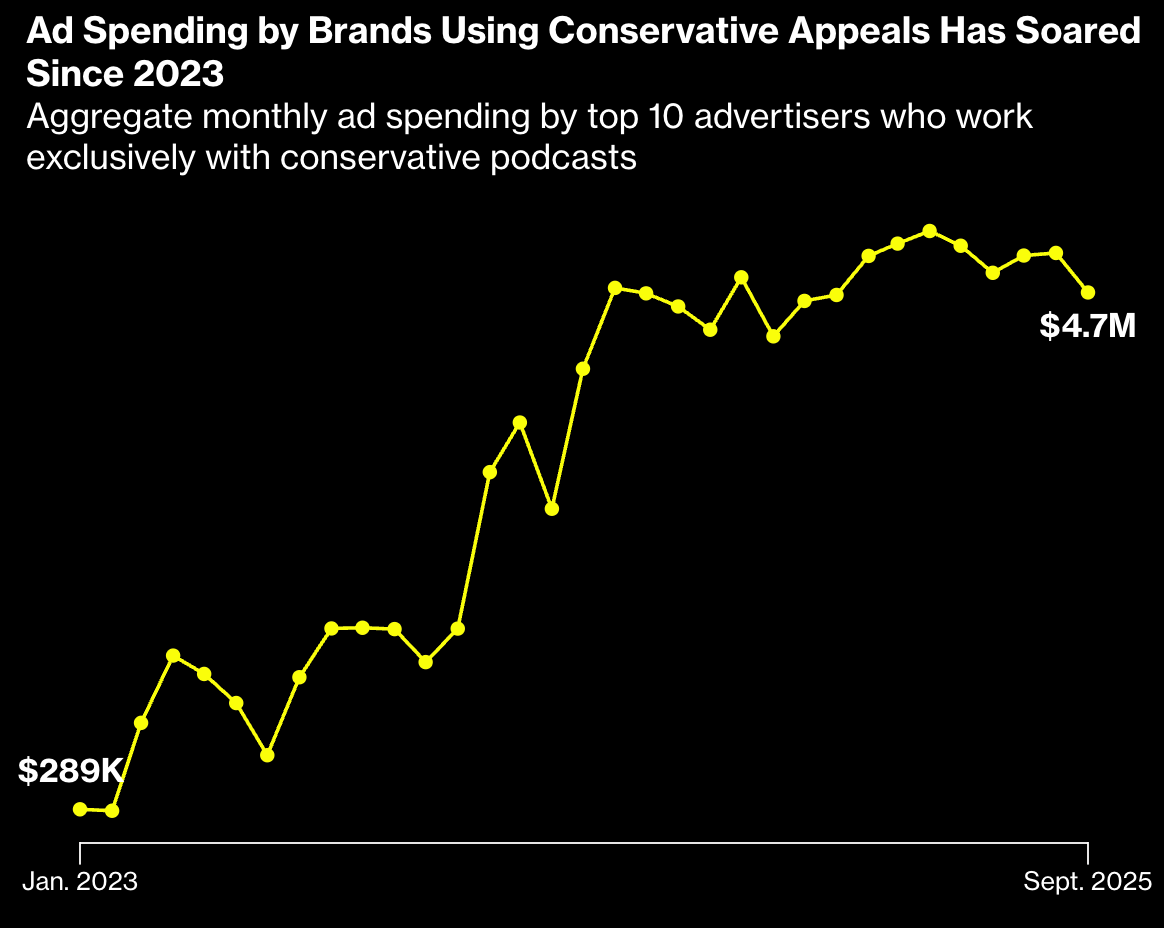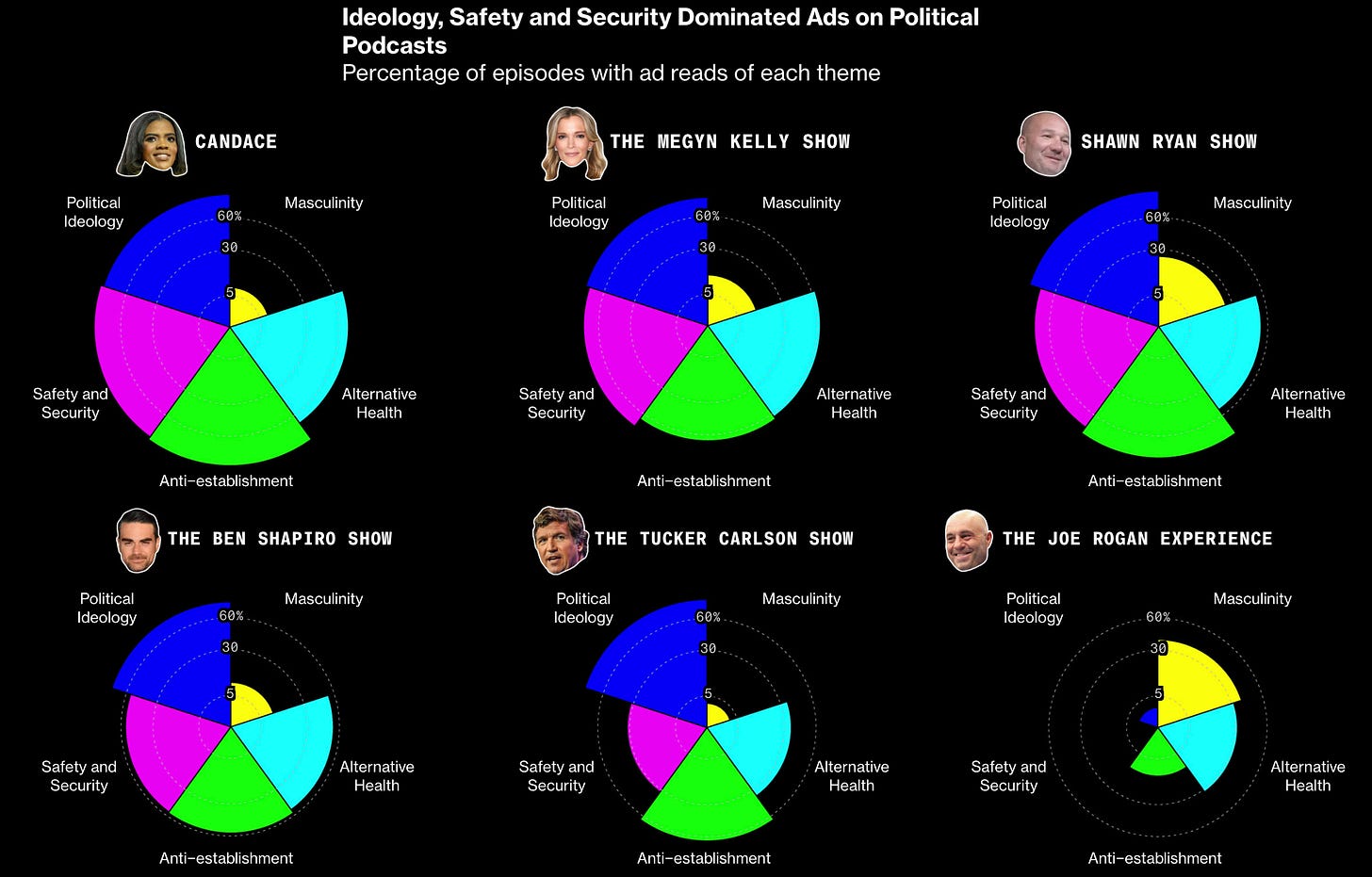The Brands Propping Up Right Wing YouTube
+ TheoBros, nation wide quarter zip meetups, family logos, advent calendar mania, Cluely's Carrie era, natsec moms, MS Now face, and a slop tax
Have you ever heard of Patriot Mobile, Birch Gold, My Patriot Supply, PreBorn, Good Ranchers, Black Rifle Coffee, or PureTalk?
If you’re an influencer espousing right wing ideology, there’s an entire suite of brands that will pump a seemingly endless amount of money into your channel and help you remain financially solvent while building your platform.
Bloomberg has a fantastic new investigation out that details the scale of these right wing brands’ advertising operations. They report, “The popularity of YouTube podcasts among conservatives is driving a boom in small businesses tailoring ads to their millions of listeners, paying hosts like Joe Rogan and Candace Owens to read out promotions in the hope that fans will place orders. The phenomenon has enriched both the hosts and YouTube, supporting further growth of the businesses using ideology to sell.”
While the Bloomberg piece focuses on things from the brand side, I’d argue that not only are these conservative influencers making these brands popular, part of the reason many rising conservative influencers are have a platform in the first place is because this right wing brand ecosystem exists to support them.
YouTube itself also plays a part. As Bloomberg notes, “Multiple studies have found that YouTube’s business model and recommendation system — designed to maximize watch time and emotional engagement — tend to amplify content that provokes strong reactions, disproportionately boosting right-wing creators and outlets.”
Still, right wing brands and small businesses play a key role in building up conservative influencers, paying them extremely high CPMs and ad rates no left leaning YouTuber could ever dream of receiving. The right wing influencers take that money and invest it back into the growth of their channels. It’s a deeply symbiotic relationship that ultimately benefits both the brand and the influencer, as Bloomberg notes.
This means that if you’re a small time aspiring right wing influencer, you have an entire ecosystem of right wing brands that will spend money and boost your platform. If you’re a centrist Democrat or mainstream liberal influencer, you have the entire world of mainstream corporate brands that will advertise with you. If you’re a left wing influencer or independent journalist challenging systems of power, you do not have a meaningful ecosystem of brand support. This creates an incredibly lop sided creator landscape.
Per Bloomberg, the right wing advertiser ecosystem is only growing:
The top 10 advertisers spending the most on host-read ads on the right-leaning podcasts are investing nearly four times more per month in 2025 than they did on average in 2023. So far this year, those brands have collectively spent about $5 million a month on podcast advertising, according to Bloomberg’s analysis of Podscribe data.
I’ve reported on this for years, but I had no idea exactly how dire the situation was until I went independent. Black, LGBTQ and other marginalized creators have suffered the most under this warped system. Because the far right is so successfully able to weaponize the internet to manufacture controversy, many mainstream brands have pulled back on advertising with any creators who read as too leftist. (I went to an event a few months ago where an entire panel was held on how marketers could avoid “becoming the next Bud Light.” The takeaway was essentially to cater to conservative culture and not risk advertising with anyone who might make right wingers on the internet mad, like LGBTQ people.)
On top of this, Bloomberg notes how much more advertising itself is using the language of right wing politics:
Some of the brands targeting conservative audiences don’t just market ideology — they say they finance political advocacy, making each purchase feel like a step toward societal change. Seven Weeks Coffee, for instance, says it allocates 10% of each purchase to crisis pregnancy centers that discourage people from getting abortions and offer services such as counseling, and has contributed over $1 million so far. Patriot Mobile, a Texas cellphone carrier that bills itself as a Christian conservative alternative to Big Wireless, established a political action committee that has directed significant funding into school board elections in Texas; the company markets its business and the PAC as intertwined, though user purchases don’t directly fund the latter. The Heritage Foundation, which advertised on Carlson’s show, shapes conservative governance through initiatives like Project 2025, a policy proposal focused on expanding presidential power and weakening or eliminating federal agencies.
I do think that there are opportunities for brands right now in the left-wing influencer space, if they’re willing to take a risk. A study from podcast advertising agency Oxford Road noted that, “shows that may be viewed as more ‘risky’ from a brand safety perspective often drive more action from their listener base.”
Still, the right has such a chokehold on the internet and online media landscape it’s going to take years of well-funded efforts to dismantle that. And right now, most liberal donors are busy wasting millions of dollars funding dubious secretive centrist Democrat dark money influence schemes rather than working to build real power online.
The entire Bloomberg investigation is worth reading. It digs into so many other aspects of the right-wing advertiser landscape and reports on specific brands and trends. I thought the MAHA section and portion of the report that talks about how much safety and security messaging dominated ads on popular podcasts was so fascinating.
Also, if you want to support my work, buy a paid subscription to this newsletter or support me on Patreon! Because I don’t have any ongoing brand partners, I rely completely on support from readers like you. 🙏



